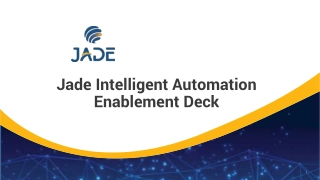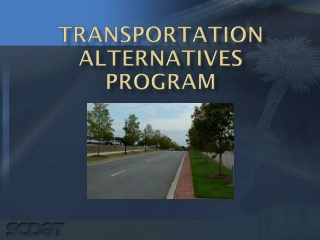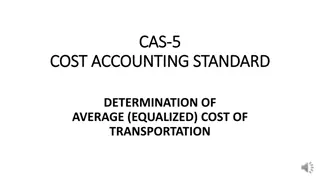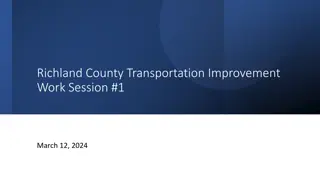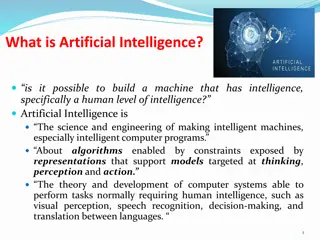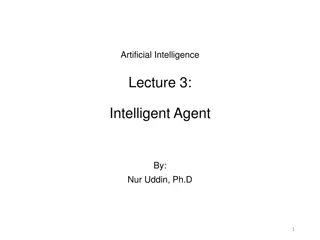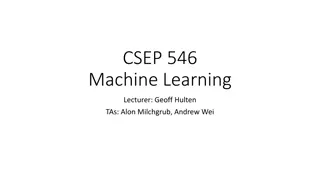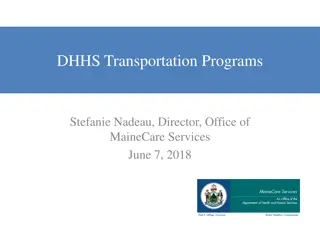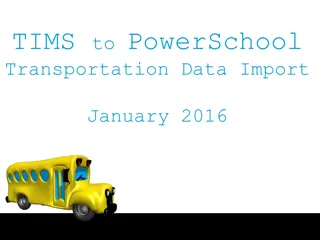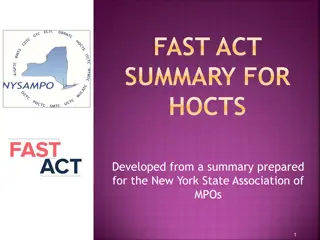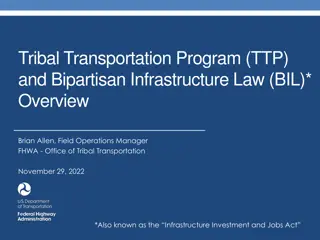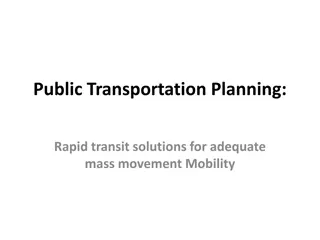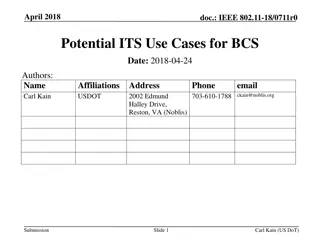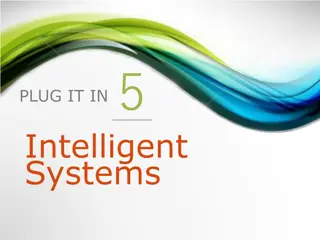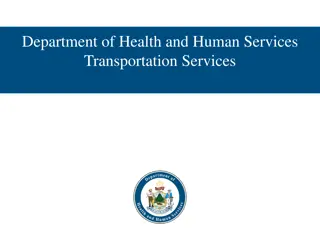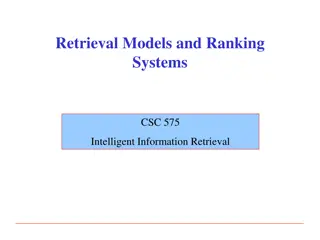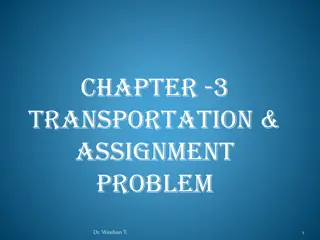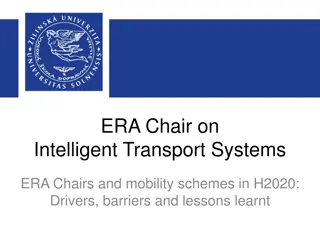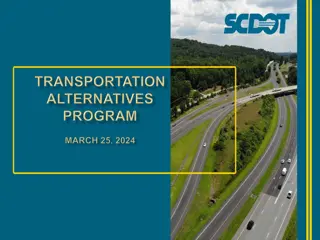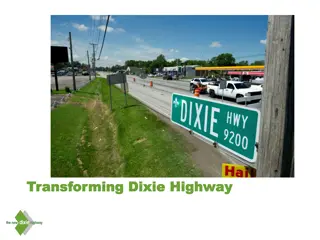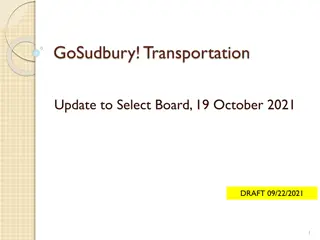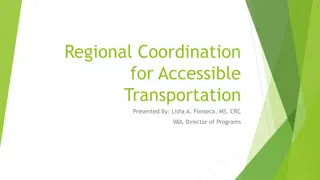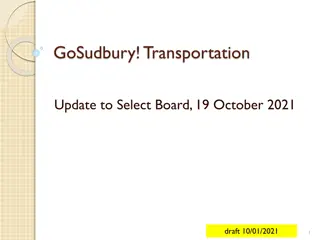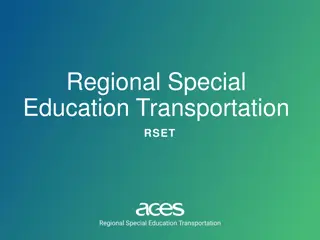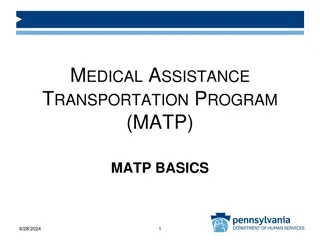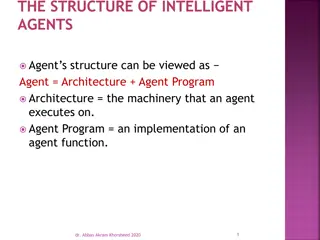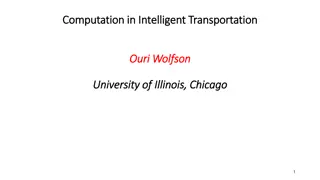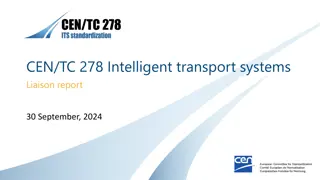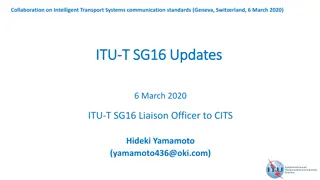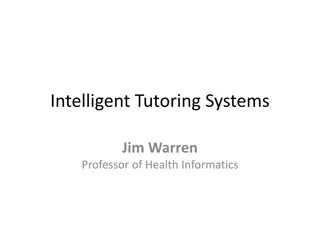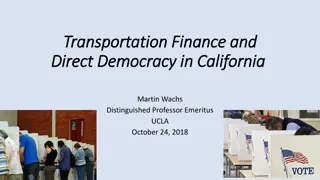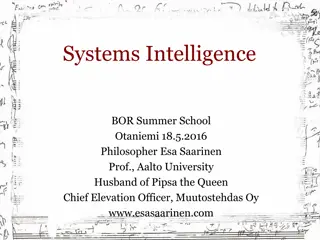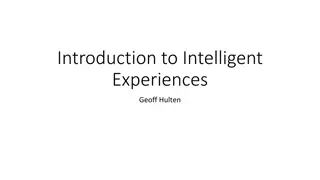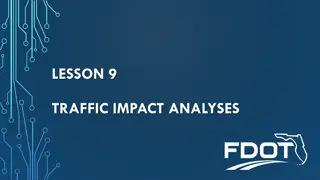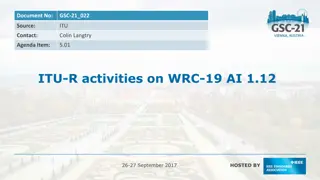Jade Intelligent Automation Enablement Deck
Explore the realm of Intelligent Automation through Robotic Process Automation (RPA) and Artificial Intelligence, enabling businesses to streamline processes, enhance efficiency, and drive digital transformation. Learn about RPA's role in mimicking human behavior, the broader perspective of RPA, com
1 views • 27 slides
Funding Opportunities for Non-Motorized Transportation in South Carolina
The US Department of Transportation's Federal Highway Administration provides funding to South Carolina through the Transportation Alternatives Program (TAP) to support non-motorized transportation initiatives. Local governments, schools, and other entities can partner with the South Carolina Depart
1 views • 21 slides
Enhancing Transportation Performance Management through TSMO Collaboration
Advancements in technology and evolving customer needs are driving changes in transportation management. Transportation Systems Management and Operations (TSMO) offers strategies to optimize operational performance, complementing traditional capacity projects. Collaboration between TSMO and Transpor
1 views • 77 slides
Cost Accounting Standards for Determining Transportation Costs
Understanding the importance of transportation costs in procurement and distribution, this guide outlines the standards for determining average costs, separation of transportation costs in accounting records, objectives for maintaining cost uniformity, components of transportation costs, and treatme
0 views • 11 slides
Understanding Transportation Programs and Trends
Transportation training session led by Megan Johnson, featuring topics such as Transportation Crash Course, Training Opportunities, and Transportation Trends & Updates. Includes discussions on different types of transportation services and their importance for communities.
2 views • 38 slides
Richland County Transportation Improvement Summary
Richland County's transportation improvement work includes sessions on project principles, funding options, project costs, and guidelines for utilizing the transportation penny. The focus is on addressing transportation needs, project prioritization, funding challenges, and division of funds for var
0 views • 19 slides
Understanding Artificial Intelligence: Building Intelligent Machines
Artificial Intelligence (AI) is the science and engineering behind creating intelligent machines that can think, perceive, and act like humans. It involves machine learning technologies, algorithms, and models that enable computers to perform tasks requiring human intelligence. AI encompasses a mult
0 views • 28 slides
Cutting-Edge Research on Extreme Environments and Intelligent Systems at LIRA Sandpit
Explore the innovative work at LIRA Sandpit focusing on developing intelligent systems for extreme environments like the nuclear industry and space. Collaborate with experts, propose ideas, and stay updated on funding calls and research opportunities in the field. Reach out to potential collaborator
0 views • 10 slides
Understanding Intelligent Agents in Artificial Intelligence
Intelligent agents in artificial intelligence act rationally to achieve the best outcomes in various environments. They operate autonomously, perceive their surroundings, adapt to changes, and pursue goals efficiently. Developing intelligent agents involves examining agents, environments, and their
1 views • 22 slides
CSEP 546 Machine Learning Course Overview
This course, led by Geoff Hulten and TAs Alon Milchgrub and Andrew Wei, delves into important machine learning algorithms and model production techniques. Topics covered include logistic regression, feature engineering, decision trees, intelligent user experiences, computer vision basics, neural net
1 views • 10 slides
Maine DHHS Transportation Programs Overview
The Maine Department of Health and Human Services (DHHS) oversees various transportation programs aimed at providing non-emergency transportation services to low-income, child welfare-eligible, and Section 17-eligible individuals. These programs are managed through regional brokerage systems, with b
3 views • 5 slides
Understanding Intelligent Agents in Chapter 2
This chapter delves into the concept of agents and environments in the realm of intelligent systems. It explores the types of agents, their functions, and interactions with environments. Rationality, performance measures, and the essence of being a rational agent are key aspects discussed. The vacuu
0 views • 28 slides
Importing TIMS Transportation Data into PowerSchool
Explore the process of extracting, formatting, purging, and importing TIMS transportation data into PowerSchool for efficient management of student transportation information. This includes creating TIMS extracts, updating bus stop information, and optimizing transportation planning through geocodin
2 views • 43 slides
Overview of FAST Act for Transportation Planning
The FAST Act, passed in 2015, authorizes federal programs for transportation development with a focus on surface transportation. It extends funding through 2020, totaling $304.7 billion. The Act aims to enhance resiliency, reliability, and stormwater mitigation in transportation systems. Planning fa
2 views • 10 slides
Tribal Transportation Program & Bipartisan Infrastructure Law Overview
The Tribal Transportation Program (TTP) and Bipartisan Infrastructure Law (BIL) provide funding for essential transportation projects in Tribal communities. The TTP Bridge Fund, Safety Fund, and High Priority Projects aim to improve infrastructure and safety. The BIL funding for FY22-FY26 totals $3.
1 views • 13 slides
Efficient Public Transportation Planning for Mass Mobility
Rapid transit solutions like high-capacity public transportation systems, including overground rail, underground rail, trams, and BRT systems, play a crucial role in enhancing mass movement efficiency. Factors such as journey time, transport costs, vehicle operating costs, and the benefits of rapid
1 views • 20 slides
Potential Intelligent Transportation System Use Cases for Broadcast Services Study Group
This presentation highlights potential Intelligent Transportation System use cases for consideration by the Broadcast Services Study Group. The use cases were derived from the Architecture Reference for Cooperative and Intelligent Transportation (ARC-IT). While not exhaustive, the presentation provi
1 views • 19 slides
Exploring Intelligent Systems: AI, Expert Systems, and More
Delve into the realm of intelligent systems with topics ranging from artificial intelligence and expert systems to neural networks, fuzzy logic, genetic algorithms, and intelligent agents. Discover the value, limitations, and applications of these technologies through real-world examples and use cas
0 views • 35 slides
Information Systems in Organizations: Overview and Implementation
Information systems play a crucial role in organizations, encompassing transaction processing systems, functional area information systems, and enterprise resource planning systems. This content delves into the purpose of transaction processing systems, the support provided by information systems ac
0 views • 30 slides
DHHS Coordination of Transportation Service Contracts Overview
The Department of Health and Human Services in Maine conducted an assessment of Transportation Services in June 2019. The workgroup identified three main priorities: alignment of Quality and Performance Measures, Safety Measures, and Evaluation of Transportation Services. The first priority involves
0 views • 28 slides
Intelligent Information Retrieval: Models, Ranking, and Algorithms
Explore the intricacies of retrieval models, ranking systems, and algorithms in the field of Intelligent Information Retrieval. Learn about the construction of indices, matching and scoring processes, distinguishing between exact-match and best-match retrieval, ranking algorithms like Boolean matchi
0 views • 36 slides
Understanding Transportation and Assignment Problem
Transportation and assignment problems involve optimizing the shipment of goods from various sources to multiple destinations while minimizing total transportation costs. These problems deal with limited supply, known demand, constant shipping costs, and integer quantities. The transportation algori
0 views • 64 slides
Advancing Intelligent Transport Systems Through ERA Chair Program
The ERA Chair program focusing on Intelligent Transport Systems (ITS) has significantly impacted research and innovation at the University of Zilina. Driven by key personnel like Dr. Karl Ernst Ambrosch, Dr. Dietrich Leihs, and Prof. Tatiana Kovacikov, the initiative has led to enhanced internationa
0 views • 19 slides
Enhancing Transportation Infrastructure Through Federal Funding Programs
The Transportation Alternatives Program (TAP) funded by the USDOT's Federal Highway Administration supports transportation projects in South Carolina based on population categories. TAP funds are allocated to Transportation Management Areas (TMAs), Small Urban Areas, and Non-Urban Areas, prioritizin
0 views • 21 slides
Transforming Dixie Highway Project Overview
The Transforming Dixie Highway project aims to address existing conditions on Dixie Highway, focusing on highway improvements, bus rapid transit, and intelligent transportation systems. Key components include crucial partnerships with transportation entities, extreme challenges such as physical cons
0 views • 13 slides
Addressing Transportation Gaps in Sudbury: A Livable Community Approach
The Sudbury Transportation Committee, established by the Select Board, aims to enhance transportation in Sudbury to create a livable community. Focusing on inclusivity, equity, and addressing transportation gaps impacting various aspects of livability, the initiative seeks to improve social particip
0 views • 16 slides
Understanding Regional Coordination for Accessible Transportation
This presentation delves into the concept of regional coordination in accessible transportation, focusing on the Regional Transportation Advisory Panel, 5-year regional transportation goals, and the significance of the Safe, Accountable, Flexible, Efficient Transportation Equity Act. It emphasizes t
0 views • 16 slides
Enhancing Livability in Sudbury Through Transportation Initiatives
The GoSudbury! Transportation Update to the Select Board on October 19, 2021 highlights the importance of addressing transportation as a key component of livable communities. The initiative aims to create a safe, secure, and inclusive environment by improving transportation options for residents of
0 views • 26 slides
Regional Special Education Transportation (RSET) Program Overview
RSET, which stands for Regional Special Education Transportation, is an initiative developed by ACES to help districts save money while safely transporting students to out-of-district placement sites. The program benefits districts by reducing transportation costs, addressing parent concerns, and ma
0 views • 13 slides
Understanding Pennsylvania's Medical Assistance Transportation Program (MATP)
The Medical Assistance Transportation Program (MATP) in Pennsylvania provides essential transportation services to access medical care. Governed by state plans and codes, MATP aims to offer access to medical, pharmacy services, chronic disease management, and preventative care. Transportation provid
0 views • 16 slides
Overview of Intelligent Agents: Structures and Types
The structure of intelligent agents consists of architecture and agent program. Different types of intelligent agents include simple reflex agents, model-based reflex agents, goal-based agents, and utility-based agents. Each type operates based on specific characteristics and methods to make decisio
0 views • 19 slides
Innovations in Intelligent Transportation Systems and Applications
In this informative content, various aspects of Intelligent Transportation Systems (ITS) are discussed, including safety applications to make drivers aware of unseen hazards, efficiency/convenience/mobility applications for on-route traffic and weather conditions, environmental/energy applications s
0 views • 75 slides
Intelligent Transport Systems Overview and Projects Update
Detailed report on CEN/TC 278 Intelligent Transport Systems focusing on areas like automated and connected vehicles, electronic fee collection, mobility integration, and various working groups. The report also highlights ongoing projects, including traffic and traveler information, public transport,
0 views • 9 slides
Recent Achievements in Intelligent Transport Systems Communication Standards
Recent achievements in Intelligent Transport Systems communication standards include the establishment of new focus groups, such as FG-AI4AD and FG-VM, to drive standardization activities for AI in autonomous driving and vehicular multimedia. These groups aim to improve safety, performance, and publ
0 views • 10 slides
Intelligent Tutoring Systems: Enhancing Learning through Technology
Explore the world of Intelligent Tutoring Systems (ITS) with Jim Warren, a Professor of Health Informatics. Learn about the dimensions of ITS, examples like AutoTutor and LISP tutor, and implications for the future of learning and MOOCs. Delve into student modeling basics, methods to acquire/update
0 views • 22 slides
Transportation Finance and Direct Democracy in California
Proposition 6 on November 6th has garnered attention, but voters in multiple states will decide on over 250 transportation ballot measures totaling over $55 billion. California, with a longer history and greater funding needs, has been at the forefront of transportation investments, including the us
0 views • 29 slides
Systems Intelligence: Enhancing Intelligent Behavior in Complex Systems
Explore the concept of Systems Intelligence, focusing on intelligent behavior within complex systems through interaction and feedback. This approach emphasizes understanding the interdependency of individuals within a larger system, enabling intelligent actions and decision-making. Delve into practi
0 views • 21 slides
Challenges and Goals of Intelligent Experiences in UX Design
Understanding the concept of intelligent experiences as highlighted by Geoff Hulten, this content delves into the goals, examples, and complexities associated with implementing intelligent interactions in various scenarios. It explores how intelligent systems can achieve objectives, change user beha
0 views • 16 slides
Understanding the Importance of Traffic Impact Analysis in Transportation Planning
Traffic impact analysis plays a crucial role in evaluating the effects of proposed developments on transportation infrastructure. This analysis helps in identifying the potential burden on the community's transportation network and ensures that growth is managed effectively. By examining short- and
0 views • 60 slides
Evolution of Intelligent Transport Systems: WRC-19 Agenda Items
Explore the ITU-R activities on Intelligent Transport Systems (ITS) during the World Radiocommunication Conference 2019 (WRC-19), focusing on harmonized frequency bands for ITS implementation, technical studies, and global resolutions. Key topics include frequency allocation for evolving ITS technol
0 views • 9 slides
